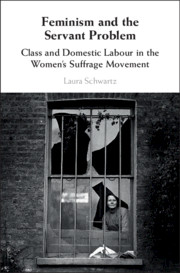Book contents
- Feminism and the Servant Problem
- Feminism and the Servant Problem
- Copyright page
- Contents
- Figures
- Acknowledgements
- Introduction
- 1 The ‘Servant Problem’ and the Suffrage Home
- 2 Servants in the Suffrage Movement
- 3 The Housework Problem
- 4 Domestic Labour and the Feminist Work Ethic
- 5 The Domestic Workers’ Union of Great Britain and Ireland
- 6 Servants and Co-operative Housekeeping
- Conclusion
- Select Bibliography
- Index
6 - Servants and Co-operative Housekeeping
Published online by Cambridge University Press: 19 July 2019
- Feminism and the Servant Problem
- Feminism and the Servant Problem
- Copyright page
- Contents
- Figures
- Acknowledgements
- Introduction
- 1 The ‘Servant Problem’ and the Suffrage Home
- 2 Servants in the Suffrage Movement
- 3 The Housework Problem
- 4 Domestic Labour and the Feminist Work Ethic
- 5 The Domestic Workers’ Union of Great Britain and Ireland
- 6 Servants and Co-operative Housekeeping
- Conclusion
- Select Bibliography
- Index
Summary
Co-operative housekeeping, the socialisation of housework through new built environments and housing for women, was widely discussed in the suffrage movement yet has caught the attention of only a few historians of ‘first wave’ feminism. Although these projects claimed to do away with the ‘servant problem’, this did not mean the end to domestic service but simply that servants would be employed by the community at large rather than by individual mistresses. This chapter uncovers the working conditions and organisation of domestic service in feminist-inspired plans for co-operative housekeeping. It examines blueprints put forward by Jane Hume Clapperton and Clementina Black, alongside schemes that were put into practice in Henrietta Barnett’s Waterlow Court and Alice Melvin’s Brent Garden Village. By focusing on the degree to which the boom in co-operative housekeeping was framed by the ‘servant problem’, I trace previously unrecognised connections between the housing schemes of middle-class feminists and the campaigns for public facilities. These working-class campaigns were informed not only by a critique of conditions endured by unwaged housewives, but also, I argue, by an awareness of the struggles of servants such as those involved in the Domestic Workers’ Union (DWU).
Keywords
- Type
- Chapter
- Information
- Feminism and the Servant ProblemClass and Domestic Labour in the Women's Suffrage Movement, pp. 183 - 207Publisher: Cambridge University PressPrint publication year: 2019

